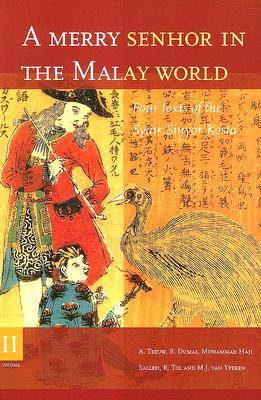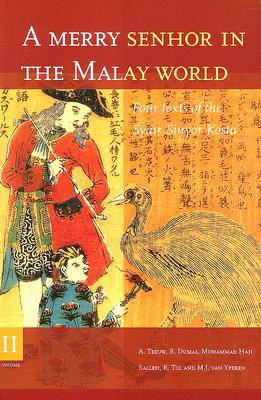
- Retrait gratuit dans votre magasin Club
- 7.000.000 titres dans notre catalogue
- Payer en toute sécurité
- Toujours un magasin près de chez vous
- Retrait gratuit dans votre magasin Club
- 7.000.0000 titres dans notre catalogue
- Payer en toute sécurité
- Toujours un magasin près de chez vous
A Merry Senhor in the Malay World (2 Vols)
Four Texts of the Syair Sinyor Kosta
112,95 €
+ 225 points
Description
Around a century ago a Malay poem which tells of a foreigner, always indicated as Sinyor, in Southeast Asia who elopes with Lela Mayang, the wife of a wealthy Chinaman. The latter sets out in pursuit of the couple and engages in a naval battle with the Sinyor in an attempt to get his wife back. The Syair Sinyor Kosta, as the poem is known, presents us with fascinating pictures and glimpses of Malay society, in this case a nineteenth-century society in transition. It reflects changing literary tastes, a pluriform society and the beginning modernization of Malay culture. In its variegated transmission, through both manuscripts and early printings, it is an illustration of the continuous interaction between Malay authors and audiences. In particular it is a remarkable piece of early evidence of literary coexistence between Malays and Chinese, who must have enjoyed this story of the merry Sinyor each in their own way, as is apparent from the continuing process of creation, reception and recreation of the text.
This book presents editions of four versions of the Syair Sinyor Kosta, of which two are translated into English. The texts are preceded by a lengthy introduction which deals with the manuscripts, their history and provenance, and their writers. The book closes with a detailed chapter with a comparative study of the four versions, an investigation of the historical setting, and an analysis of the language used in the texts. All volumes of the print edition will become available in individual e-books: 9789004531857 (volume 1) - 9789004531864 (volume 2).
This book presents editions of four versions of the Syair Sinyor Kosta, of which two are translated into English. The texts are preceded by a lengthy introduction which deals with the manuscripts, their history and provenance, and their writers. The book closes with a detailed chapter with a comparative study of the four versions, an investigation of the historical setting, and an analysis of the language used in the texts. All volumes of the print edition will become available in individual e-books: 9789004531857 (volume 1) - 9789004531864 (volume 2).
Spécifications
Parties prenantes
- Editeur:
Contenu
- Nombre de pages :
- 480
- Langue:
- Anglais
- Collection :
- Tome:
- n° 30
Caractéristiques
- EAN:
- 9789067182164
- Date de parution :
- 01-01-04
- Format:
- Livre broché
- Format numérique:
- Trade paperback (VS)
- Dimensions :
- 161 mm x 241 mm
- Poids :
- 376 g

Les avis
Nous publions uniquement les avis qui respectent les conditions requises. Consultez nos conditions pour les avis.





